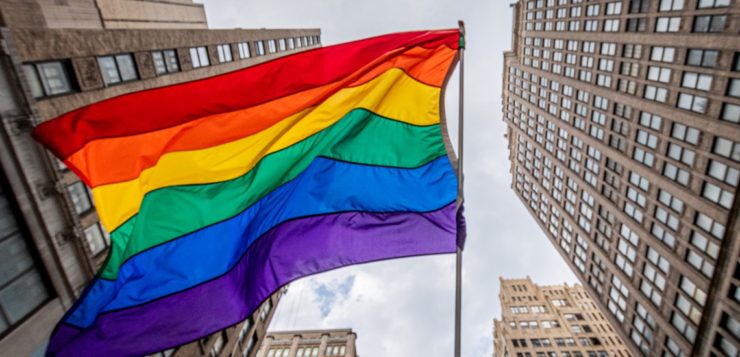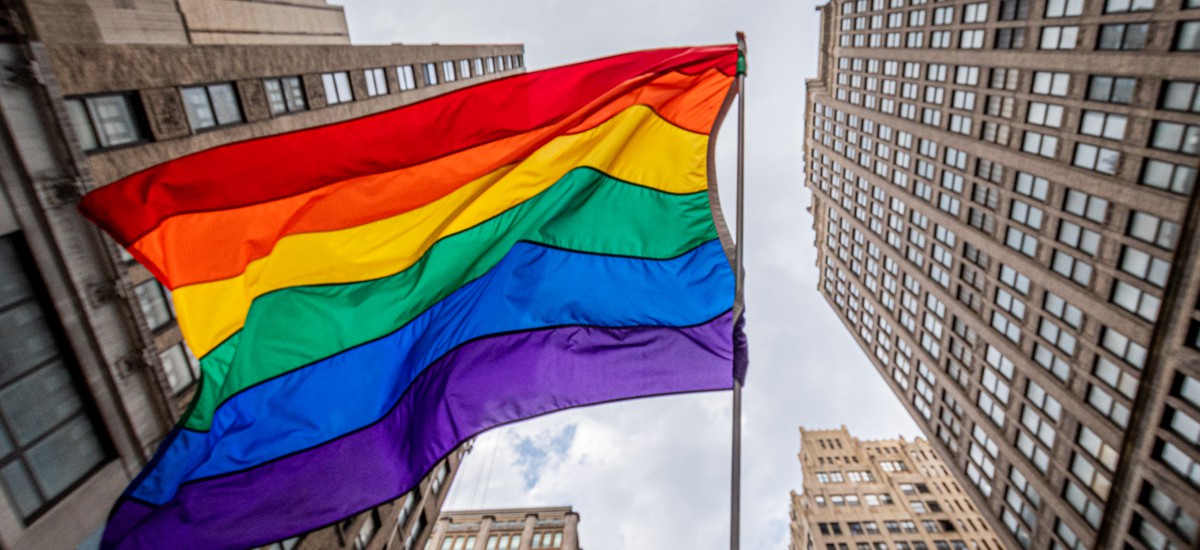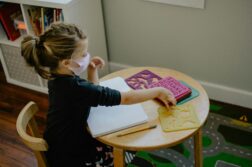A Seat at the Table: LGBTQ Representation in New York Politics is a digital oral history collection housed by the LaGuardia & Wagner Archives, who hosted a virtual exhibit in partnership with the New York Historical Society during Pride 2022. The collection, which is free to the public online, provides valuable insight into the lives and minds of 21 LGBTQ legislators in New York City Council and the New York State Legislature. It’s a significant wellspring of information for people interested in New York City history, the history of LGBTQ activism, and more.
Stephen Petrus, a historian in the LaGuardia and Wagner Archives at LaGuardia Community College, spearheaded the process of interviewing of the legislators. He worked with other members of the LaGuardia Community College community, including Allie Brashears, Valerie Pires , Brandon Calva, and others to interview, record, and edit the interviews into accessible YouTube videos housed on the project’s webpage. Photographs of the interviewees were taken by student photographers under the mentorship of Thierry Gourjon-Bieltvedt, a professor in the Fine Arts department at LaGuardia Community College. Petrus and Gourjon-Bieltvedt assembled a thoughtful and intimate collection of LGBTQ legislators’ testimonies, building on similarly formatted earlier projects like Rainbow LaGuardia, a collection of photographs and corresponding video interviews of 27 LGBTQ faculty and staff at LaGuardia.
The virtual exhibit is a comprehensive collection of oral history interviews that, despite their relative brevity, cover a wide variety of topics and an impressive ensemble of individuals. Members of the project interviewed and photographed every LGBTQ-identified member of New York City Council and State Legislature based in New York City, including currently serving members and former members. The sole exceptions include Councilmember Kristin Richardson Jordan of Harlem, whose addition to the collection is pending, and two of the earliest out gay members of Council, the late Phil Reed and Antonio Pagán. Individuals interested in the lives and work of LGBTQ politicians in New York City could not ask for a better resource.
These oral history interviews shed a light on the complex lives of these legislators, underscoring their many similarities but also important differences. Questions posed to the interviewees range significantly, selected to provide a nuanced perception into the lives and minds of these legislators. Many interviewees discuss their political history and address their campaigns, political beliefs, activist backgrounds, and general work as public servants. From these stories, it is evident that while all the interviewees worked to advance LGBTQ issues in New York City politics, many of them also engage with a variety of political issues.
One of the main lessons to be taken from A Seat at the Table is that there is no “one-size-fits-all” formula when it comes to New York City’s LGBTQ legislators. This collection presents its interviewees as a mosaic—a group of unique individuals who, when viewed together, represent the diversity of the New York community. City Council Member Margarita Lopez discusses her work around the Puerto Rico independence movement and feminist activism. City Council Member Daniel Dromm reflects on how important education and curricular reform are in his work as a public servant. Viewers interested in exploring the complexity of these positions and histories have much to gain from this collection.
Additionally, many of the questions posed to the interviewees are seemingly apolitical, less policy-oriented, and more focused on personal details. For example, nearly every interviewee was asked about their coming out process and their experiences as LGBTQ youths. From these heartfelt testimonials, viewers are granted a more intimate insight into the lives of LGBTQ New York City legislators and might develop a greater appreciation for the diversity of their experiences. City Council Member Rosie Mendez candidly explores how, for her, coming out was a continuous and changing process. City Council Member James Vacca presents viewers with a story about his first crush, and details how bullying in middle school and high school had a long-term negative effect on him and continues to be a hurdle for LGBTQ students today. This biographical component to the oral history collection humanizes the legislators and recontextualizes their work in both the broader relevant social and cultural movements and their own personal history.


Many of the individuals interviewed for the collection are also the first of their kind—not merely the first in their families to achieve political success, but often “the first” in a larger sense. Assembly Member Deborah J. Glick is the first openly gay elected official in New York City history; Christine Quinn, who was New York City Council’s first openly lesbian Speaker; Crystal Hudson is the first gay Black woman elected to City Council, along with Kristin Richardson Jordan. Despite New York City’s long history of LGBTQ culture and activism, its history of LGBTQ politicians is comparatively short, and there’s clearly a long way to go. The interviewees seem to have a shared awareness that they represent a broader shift in the culture, and that there is still a lot of work to be done for the advancement of LGBTQ issues in New York.
Perhaps the most valuable resources accompanying the collection are the three curriculum units, a pedagogical component of the collection spearheaded by Stephen Petrus. The three curriculum lessons are: “LGBTQ Exclusion and Inclusion in the St. Patrick’s Day Parade from 1990-2016”; “LGBTQ Homeless Youth in New York City”; and “Exclusionary Zoning and the Decline of Sex Work in Times Square from 1994-1997.” These units are carefully curated with lesson objectives, relevant timelines and historical information, thorough evidentiary support, primary sources and images for student engagement, and overall serve as an excellent resource for NYC educators looking to introduce their students to LGBTQ history. Currently, Petrus is working to share these curriculum units with high school teachers and college instructors, to broaden public knowledge about LGBTQ New York City history, and to underscore the roles that the interviewed legislators played in the ongoing struggle for equality. These curriculum units need not be used in their entirety, nor do all three need to be taught together. They are flexible, independent curriculum modules that complement the oral history. A Seat at the Table is aptly titled. Encompassing the diverse backgrounds and varied stories of the interviewed legislators, the theme stitching the collection together is the consensus that LGBTQ visibility in politics and holding elected positions of power is critical. This is most poignantly addressed by City Council Member Jimmy Van Bramer in his discussion of queer political representation in Queens, in which he states: “If I was going to run for office, I wanted to do it in the neighborhood I grew up in… because I always understood from a very early, early time that queer people running for office is incredibly important. And even though the world has changed in so many ways, and we have so much more space to be who we are and so many more freedoms, it’s still important for young queer people to see powerful queer people. To see queer people in positions of power. At the seat of the table, making decisions.”
This sentiment is echoed by State Senator Thomas Duane, the first openly gay member of the New York State Senate. When asked why LGBTQ representation in politics matters, Duane says: “There is no substitute for a seat at the table. There just isn’t.”
Taken as a whole, the collection is greater than the sum of its parts. At a time when LGBTQ rights are increasingly under attack across the country, the combined testimonies of the NYC legislators resonate as both an affirmation of LGBTQ diversity and resilience and a call to political action. There truly is no substitute for a seat at the table.
 Adam Kocurek is a History PhD candidate at The Graduate Center, CUNY. He specializes in 20th century American labor and cultural history, with an emphasis on LGBT history and histories of activism, gender, and sexuality. He teaches Modern American History at Hunter College. He also reviewed the virtual exhibition We Are Kind Of More: Gen Z Reframes Gender and Sexuality hosted by the Leslie-Lohman Museum of Art last year, which you can read here.
Adam Kocurek is a History PhD candidate at The Graduate Center, CUNY. He specializes in 20th century American labor and cultural history, with an emphasis on LGBT history and histories of activism, gender, and sexuality. He teaches Modern American History at Hunter College. He also reviewed the virtual exhibition We Are Kind Of More: Gen Z Reframes Gender and Sexuality hosted by the Leslie-Lohman Museum of Art last year, which you can read here.







